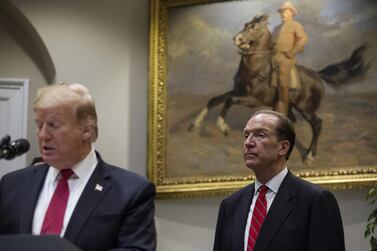Global foreign direct investment flows declined for the third consecutive year in 2018 due to tax changes for US multinationals and a slow investment environment, a UN report says.
Total FDI flows declined 13 per cent for the year to $1.3 trillion, the latest annual World Investment Report by the UN Conference on Trade and Development says.
FDI flows to developed economies reached their lowest point since 2004, down by 27 per cent to about $500 billion.
“Inclusive sustainable development depends on a global policy environment that is conducive to cross-border investment,” UN Secretary General Antonio Guterres said in a foreword to the report.
“Last year, global flows of foreign direct investment fell to the lowest level since the global financial crisis, underlining the lack of growth in international investment this decade.”
The decline last year was mainly due to repatriation of accumulated foreign earnings by US multinational companies in the first two quarters of 2018, after tax reforms introduced by Washington at the end of 2017.
The new regulations permit the US government to tax profits accumulated overseas, regardless of where the money was held.
Under the previous rules, companies were allowed to defer US tax on worldwide profits unless they repatriated the money.
After the changes took effect, money brought home rose to about $300bn between January and March 2018, before easing to $93bn between July and September, US current account data published in December showed.
Inflows in the US declined by 9 per cent to $252bn, the UN report showed.
But the changes also caused a ripple effect. FDI flows to Europe halved to less than $200bn in 2018, with negative inflows in a few large host countries because of funds repatriation, and a 36 per cent annual drop in the UK to $60bn, the report said.
However, the fall was cushioned by an 18 per cent increase in the value of cross-border mergers and acquisitions in the second half of 2018, driven by US multinationals using liquidity in their foreign affiliates.
In 2019, FDI is expected to see a rebound in developed economies as the effects of the tax reforms wind down.
Greenfield project announcements, which indicate future spending plans, were up 41 per cent in 2018, indicating a probable resurgence in overall FDI levels, the report added.
Despite the rebound, UN projections show a modest 10 per cent recovery to about $1.5tn, below the past decade’s average.
“The underlying FDI trend remains weak," the report said. "Trade tensions also pose a downward risk for 2019 and beyond."
In 2018, flows to developing countries remained stable, rising by 2 per cent to about $600bn.
As a result of the increase, and the fall in FDI in developed countries in 2018, developing countries’ share of global foreign investment increased to a record 54 per cent.
FDI flows to Africa rose by 11 per cent to $46bn, supported by continued resource-seeking, diversified investments and a recovery in South Africa.
Flows to developing Asia, the largest recipient region, were up 4 per cent, and greenfield project announcements in the region doubled in value.
FDI in Latin America and the Caribbean was 6 per cent lower than in 2017.
The US, followed by China, Hong Kong and China combined, then Singapore, were ranked the top four countries globally with the largest volumes of FDI inflows, the report said.
For FDI outflows, Japan topped the list followed by China and France.
In the Middle East, Saudi Arabia and the UAE made the list of top 30 countries for FDI outflows, with $21bn and $15bn.
The report also showed that FDI flows to “structurally weak and vulnerable” economies continued to account for less than 3 per cent of the global total – about $24bn, in line with the average for the past decade.
“The significant acceleration required to meet the investment needs associated with the UN’s Sustainable Development Goals is not yet apparent,” Mr Guterres said.
“We need to raise ambition climate action, address debt vulnerabilities and reduce trade tensions to foster environments that are conducive to scaling up long-term and sustainable investments.”






